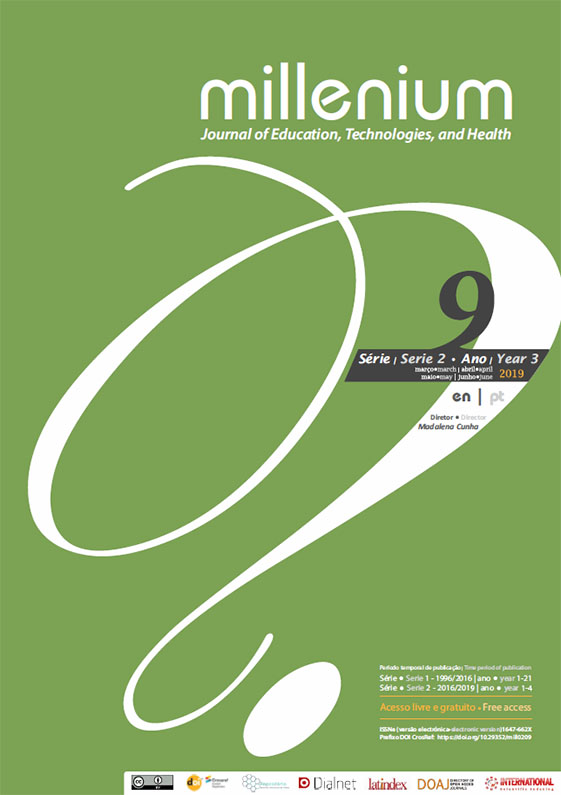Linguistic skills required by Portuguese employers in the past 40 years: the case of office management professionals
el caso de los profesionales de secretariado
DOI:
https://doi.org/10.29352/mill0209.10.00209Keywords:
Languages, job advertisements, skills, secretarial/office management positionsAbstract
Introduction: With internationalization and globalization, language skills are increasingly useful in today’s labour market, especially in functions that require contacts with other markets, such as secretarial/management support positions.
Objectives: Identify and analyse the language skills required in job advertisements for secretarial /office management professionals.
Methods: Study of 844 job ads for secretarial/office management positions, published in the newspaper Jornal Expresso (1978-2018), in March. Possible requirements for language skills used in each advertisement were examined. The data was studied globally and in terms of temporal evolution.
Results: 78.8% of the analysed advertisements have language requirements, predominating those in which 2 languages are requested. The most requested foreign languages are English and French. In 67.2% of the references, there is an explicit mention of oral or written competencies. There is a great diversity of formulations referring to the level of proficiency sought, prevailing the requests for “domain” in the cases of English, French and German, and “satisfactory knowledge/knowledge” for Spanish.
Conclusion: Language skills are essential for secretarial/office management professionals. They must have a good knowledge of their mother tongue, as well as of at least two foreign languages in which they must demonstrate good levels of proficiency.
Downloads
References
Barreto, A. (2015). População e Sociedade. In A. C. Pinto (Coord.), A Busca da Democracia: 1960 – 2000 (pp. 113-143). Lisboa: Editora Objetiva.
Borges, M. (2015). Secretariado: Uma Visão Prática. Lisboa: ETEP.
Broek, S., & van den Ende, I. (2013). The implementation of the Common European Framework for Languages in European Education Systems: Study. Brussels: The European Parliament's Committee on Education and Culture.
Cabral-Cardoso, C., Estêvão, C., & Silva, P. (2006). Competências Transversais dos Diplomados do Ensino Superior. Guimarães: TecMinho.
Calvão, A. R., Simões, A. V., & Dimas, I. (2016). Office Management Professionals: essential skills in a global marketplace. In E.
Santos et al. (Coord.), Práxis e Inovação em Secretariado. Castelo Branco: Instituto Politécnico de Castelo Branco.
Cardoso, G., Mendonça, S., & Paisana, M. (2016). Anuário da Comunicação 2014 – 2015. Lisboa: Observatório da Comunicação. Available at: https://obercom.pt/wp-content/uploads/2016/06/Anu%C3%A1rio-da-Comunica%C3%A7%C3%A3o-2014-2015.pdf.
Conselho da União Europeia. (2014). Conclusões do Conselho, de 20 de maio de 2014, sobre o multilinguismo e o desenvolvimento de competências linguísticas. Available at: https://publications.europa.eu/en/publication-detail/-/publication/18fb5e89-f38a-11e3-831f-01aa75ed71a1/language-pt
Dubois, L., LeBlanc, M., & Beaudin, M. (2006). La langue comme ressource productive et les rapports de pouvoir entre communautés linguistiques. Langage et Société, 118, (4), pp. 17-41.
European Commission. (2012). Staff Working Document for Rethinking Education: Investing in Skills for Better Socio-economic Outcomes. Strasbourg, 20 Nov. 2012, SWD 372. Available at: https://eur-lex.europa.eu/legalcontent/EN/TXT/PDF/?uri=CELEX:52012SC0372&from=EN
Hagen, S. et al. (2006). ELAN: Effects on the European economy of shortages of foreign language skills in enterprise. Reading: CILT, The National Center for Languages.
Moura, M. A. (2008). Trabalho e Competências em Transformação: O Papel da Profissional de Secretariado. Revista Expectativa, volume 7 (número 7), pp. 27-49.
Oliveira, C., Pacheco, S., Neves, S. & Lima, F. (2017). Educação e formação de adultos em Portugal: retrato estatístico de uma década. Lisboa: Instituto Nacional de Estatística. Available at: https://www.ine.pt/xportal/xmain?xpid=INE&xpgid=ine_estudos&ESTUDOSest_boui=313014545&ESTUDOSmodo=2
Pôle-Emploi. (2018). Enquête Besoins en Main-d’Oeuvre 2018. Available at: http://statistiques.pole-emploi.org/bmo/
Rankin, D. & Schumack, K. (2017). The Administrative Professional: Technology and Procedures. Available at:
https://books.google.pt/books?id=uXUcCgAAQBAJ&printsec=frontcover&hl=pt-
PT&source=gbs_ge_summary_r&cad=0#v=onepage&q&f=false.
Reto, L. et al. (2012). Potencial económico da língua portuguesa. Lisboa: Texto Editores.
Rosa, M. & Chitas, P. (2013). Portugal e a Europa: os Números. Lisboa: Fundação Francisco Manuel dos Santos.
Ribeiro, Calvão & Simões (2018, June). Procuram-se secretários(as) competentes: análise do perfil do secretário(a) requerido por empregadores portugueses. Paper presented at VIII Jornadas de Secretariado e Assessoria, Escola Superior de Tecnologia e Gestão de Águeda - Universidade de Aveiro.
Smith, J. (2013, October 14). When to start a new job search [web log post]. Available at:
https://www.forbes.com/sites/jacquelynsmith/2013/10/14/when-to-start-a-new-job-search/#38491b4d5812.
Tuorinsuo-Byman, S. (2008). European management assistants: Work, challenges and the future. Helsínquia: Haaga-Helia University of Applied Sciences.
Santos, E., Brunheta, V., & Franco, H. (2016). O Secretariado no Mundo Global. In E. Santos et al. (Coord.), Práxis e Inovação em Secretariado. Castelo Branco: Instituto Politécnico de Castelo Branco.
Vieira, D. & Marques, A. (2014). Preparados para trabalhar?. Fórum Estudante, Consórcio Maior Empregabilidade.
Zárraga, M., Araluce, M., & Erviti, M. (2012). Propuesta de competencias para un grado en asistencia de dirección en el contexto de los nuevos planes de estudio dentro del espacio europeo de educación superior (EEES). Intangible Capital, 8(2), pp. 181-2015.
Downloads
Published
How to Cite
Issue
Section
License
Authors who submit proposals for this journal agree to the following terms:
a) Articles are published under the Licença Creative Commons (CC BY 4.0), in full open-access, without any cost or fees of any kind to the author or the reader;
b) The authors retain copyright and grant the journal right of first publication, allowing the free sharing of work, provided it is correctly attributed the authorship and initial publication in this journal;
c) The authors are permitted to take on additional contracts separately for non-exclusive distribution of the version of the work published in this journal (eg, post it to an institutional repository or as a book), with an acknowledgment of its initial publication in this journal;
d) Authors are permitted and encouraged to publish and distribute their work online (eg, in institutional repositories or on their website) as it can lead to productive exchanges, as well as increase the impact and citation of published work
Documents required for submission
Article template (Editable format)





